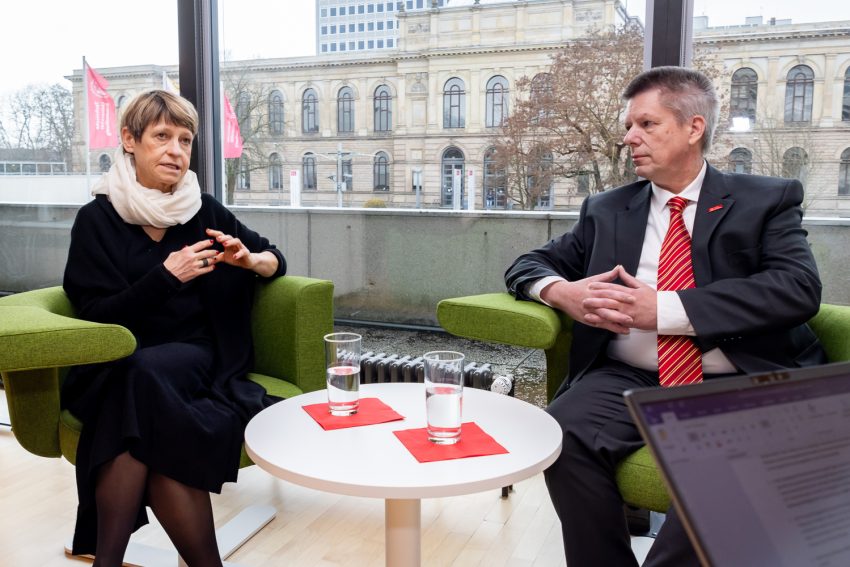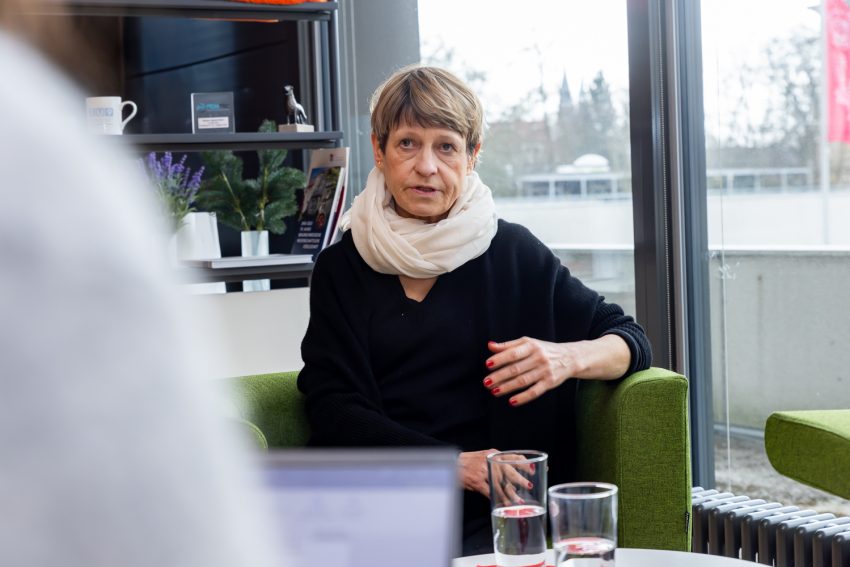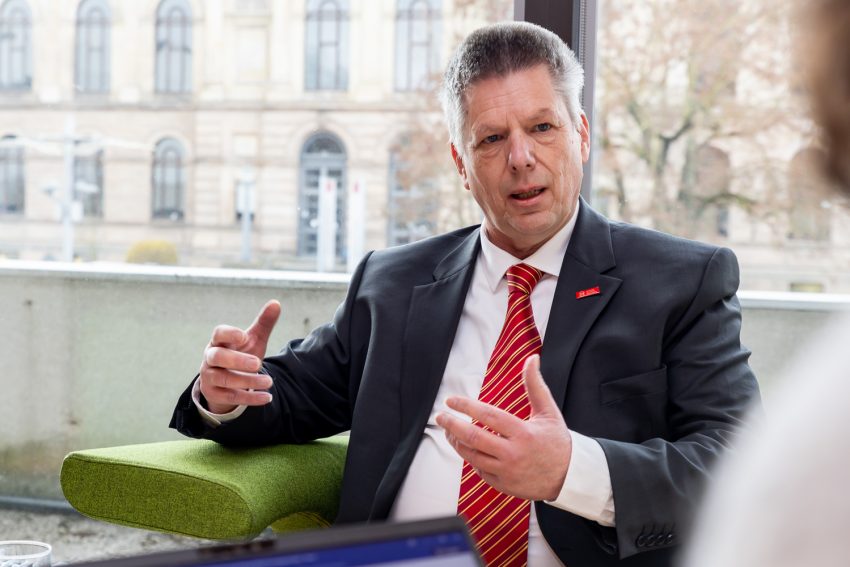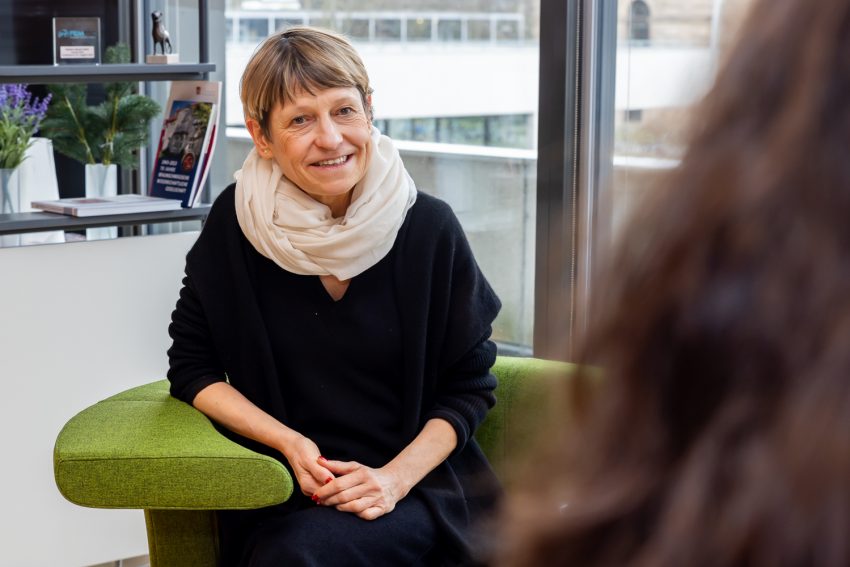Excellence strategy and more: What is on the agenda for the performance dimension of research in 2024? Interview with President Angela Ittel and Vice President for Research Peter Hecker
In what format does the work on the continuation applications take place and what time frame are we talking about?
Ittel: We are already in the active preparation phase, in which regular writing workshops and consultation meetings take place, also with international external peers. Each cluster has its own work plan, which is closely coordinated with the Executive Board and our partners. The focus must be on developing new, innovative content. The clusters receive support from EX-Lab, an advisory team made up of different functional units at TU Braunschweig, which is organized by the Project House. The clusters also regularly exchange ideas with Professor Hecker and me and also the entire Executive Board.
In addition to the direct research ideas and approaches, topics such as support for scientists in qualification phases, the internationalization of research, knowledge transfer and equality also play an important role in the evaluation of the applications by the international reviewers. I am very proud that both clusters receive great advice and support from the relevant units in our administration. Work on the cluster topics and applications is now given top priority on a broad level.
Hecker: In addition to the monthly consultation appointments with the cluster representatives, the President and I are of course in regular personal communication with our teams. In principle, applications must be submitted to the German Research Foundation (DFG) by August 2024. The assessment phase then begins, which also includes a hearing. This will take place from October 2024 to February 2025. The results will finally be published in May. If both clusters are successful – which we of course very much hope for – TU Braunschweig will then be able to apply again for the status of a university of excellence.
What role does the possible success in the excellence strategy play for the future of our University? Is there a future without a title of excellence?
Ittel: I can confidently affirm that there is indeed a future, and a bright one at that, for TU Braunschweig. While funding through the Excellence Strategy can significantly contribute to shaping this future, it’s not the sole way or opportunity for the University’s promising development. Hence, it is crucial for me to stress the importance of formulating a strategy that will sustain us in the long run, irrespective of our success in the upcoming competition for university excellence status. This holds true even if we face challenges due to having only one cluster or fail to advance at all.
A central aspect of this concept is that we are part of a very strong research region. We often talk about the fact that Braunschweig is one of the most research-intensive regions in Europe. This raises the question: How well connected are we in our region? How well do we know the research institutions, industrial and cultural partners in our region? How well do we use our shared potential? Not just bilaterally, but also in the network. In the coming years, we want to deepen our collaboration with our regional partners, identify new synergies and expand existing ones. There are many previously unused opportunities here, from research projects to joint service offerings and governance structures.
Hecker: Non-university research institutions have already become an integral part of our coordinated collaborative projects. In the QuantumFrontiers Cluster of Excellence, PTB plays a central role alongside the Leibniz University of Hannover. The German Aerospace Center (DLR) is a strong partner in aviation projects, helping to cover the complex research questions of climate-friendly aviation in the necessary depth and breadth. In this sense, we also want to leverage potential in our other research areas that arise from cooperation with the diverse research institutions, for example in the life sciences, but also other scientific areas. Together we can create critical masses that make us even more visible in international competition.
In the past few months we have celebrated several successes in our research, including the first acquisition of an Alexander von Humboldt Professorship at TU Braunschweig, the Transregional Collaborative Research Centers in the area of additive manufacturing in construction and research into highly integrated methods of aircraft development, as well as the ERC grant in the area of coastal protection. Where do you see the greatest potential for research at TU Braunschweig? And what strategic priorities would you like to set in order to strengthen the competitiveness of TU Braunschweig?
Ittel: We are working on identifying flagship projects that link our Core Research Areas. The aim is for us to build so-called ecosystems around these key topics and support the integration of other stakeholders. In the next step, we will use our application for the “Unfolding strategic potentials” funding program. This program was announced by the Lower Saxony Ministry of Science and Culture together with the VW Foundation in order to give Lower Saxony universities a boost in their development. We are one of the four universities that are allowed to apply for funding of up to 25 million.
Hecker: A key to success will be the support services for the researchers. Our Research Service already offers excellent advice and provides information about funding offers and best practice practices from other national and international research partners. To do this, we procure and adapt tools for managing research processes and metadata. Particularly noteworthy here is the Research Information System, which is already being implemented. The system will provide added value for everyone involved, from researchers to administration, through the seamless presentation of research information and support in managing projects. Furthermore, it will help us to identify our research strengths and opportunities, but also our untapped potential, thereby creating a transparent basis for our strategic decisions in the area of research. Of course, the decisive factor will be how well the data is populated into the system. This is where I advertise and hope for the committed cooperation of our researchers. We assume that the system will be fully available by the end of 2025.
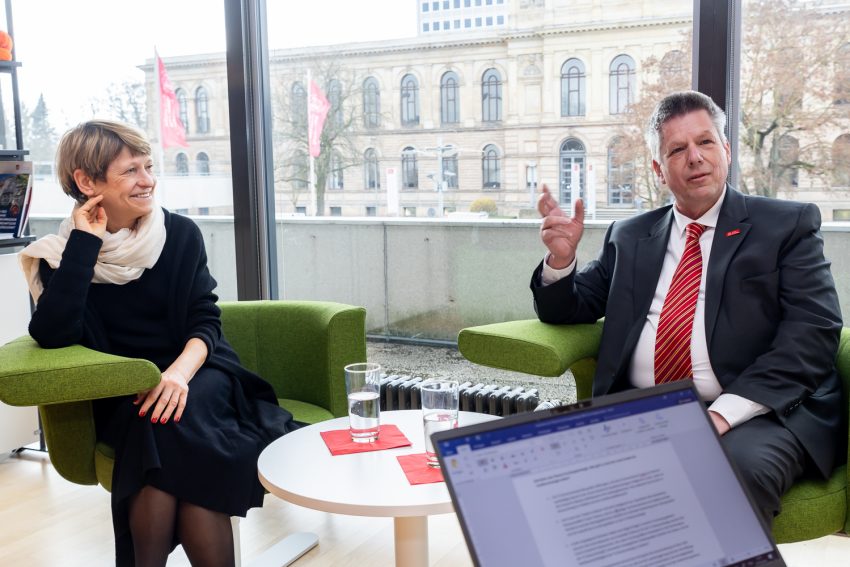
President Angela Ittel and Vicepresident Peter Hecker. Bildnachweis: Philipp Ziebart/TU Braunschweig
You mentioned the Research Information System. What other tools and measures are currently being implemented to strengthen the research projects at our University?
Hecker: I would particularly like to highlight our participation in the Coalition for Advancing Research Assessment (CoARA). By the beginning of March 2024, more than 600 organizations worldwide have already joined the initiative, which will reform the evaluation of research performance using the well-known quantitative key figures and thus put it on a qualitative basis. By joining the coalition, we support the efforts to create a scientific space in which primarily qualitative assessments, for example through transparent peer reviews, are complemented by quantitative indicators in a responsible and comprehensible manner. We have drawn up an action plan to meet the requirements of CoARA and will implement it step by step over the coming years.
In addition, many more exciting challenges and areas of action await us in 2024. This includes, in particular, the development of the Wolfsburg Campus with our local partners as well as the development of new communication formats and event offerings on ethics in research.
Ittel: We have a lot of work to do in this year, especially with regard to the applications for Clusters of Excellence and the implementation of measures for the internal organization of TU Braunschweig. We are currently developing this as part of the “Unfolding strategic potentials” application. Despite all the efforts that lie behind us and ahead of us, it will be important that we prepare for a marathon. On this path we want to maintain our clear vision and a positive attitude. We always have to take care of ourselves and our colleagues and support each other.
I am confident that we have everything we need to successfully cope with what lies ahead. We can draw strength from the many opportunities for exchange that we create to enable transparency and participation. It is always very inspiring for me to exchange ideas and concepts with our members in order to discover and develop the potential of our university. I hope that curiosity for each other and for the world that makes up TU Braunschweig will continue to accompany us all in the coming months.
The interview was conducted by Asmik Kostandian.

